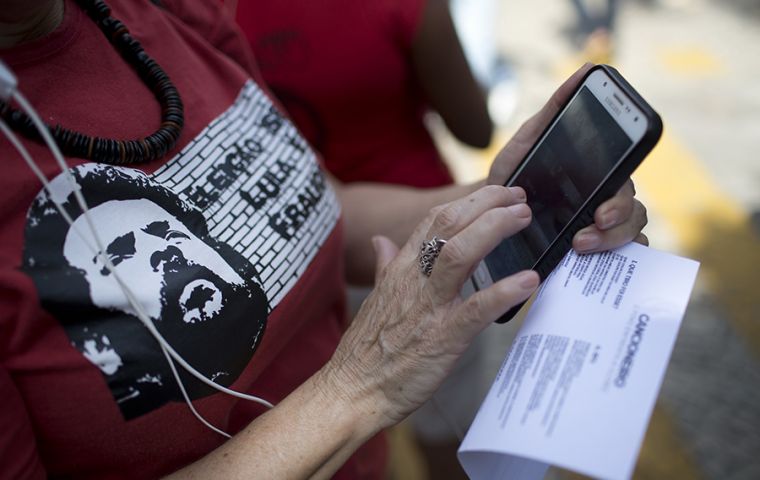MercoPress. South Atlantic News Agency
Voters carrying cell phones into booths may be arrested, Brazil's TSE rules
 De Moraes' opinion on the matter prevailed
De Moraes' opinion on the matter prevailed Brazil's Superior Electoral Court (TSE) Thursday issued a plenum ruling banning the use of cell phones within voting booths in the October presidential elections, even if the device is turned off.
Thus, the TSE reversed previous decisions in the opposite direction and mandated that voters may not, under any circumstance, take a cell phone into the voting booth, under penalty of committing an electoral crime for which they might be arrested.
The devices must be handed over to electoral clerks before the voter reaches the booth, the TSE said. The ruling was issued in response to a query from the União Brasil party, in light of changes in the resolution that addresses the issue.
As per the latest wording of the bylaw, cell phones, and other electronic devices “should be turned off or put away, without being handled in the voting booth, which differs from previous elections. In 2018 and 2020 the devices would be under the custody of the electoral clerk or left anywhere else, at the voter's discretion.
In responding to the consultation, the TSE judges followed the understanding of Chief Justice Alexandre de Moraes, who considered it impossible to allow the voter to keep the cell phone in his pocket, for example, since the clerk will not be able to enter the voting booth to check whether the device is on or off.
”There was a relaxation by the TSE at one point, allowing one to enter [with the cell phone in the booth], as long as it was turned off, that it was in the pocket. It turned out that this is not satisfactory, since the clerk cannot enter the voting booth, which is impervious, to check whether or not the voter has turned on the cell phone,“ De Moraes argued.
The ban on the use of cell phones, or any other equipment capable of recording or transmitting the act of voting, was approved by Congress because of the risk of breaching the secrecy of the vote. For this reason, De Moraes warned that any voter who disrespects the determination and enters the booth with a cell phone can be arrested under Article 312 of the Electoral Code, which provides for up to two years of detention for those who ”violate or attempt to violate the secrecy of the vote.“
According to De Moraes, military police commanders from some states expressed their concern during a meeting at the TSE courthouse about the violation of the secrecy of the vote, for example, in militia regions, where voters could be forced to record for whom they had voted.
After De Moraes' allocution, the other Justices concurred, including the case's rapporteur Sergio Banhos.
An educational campaign should be prepared immediately by the TSE to inform voters about the ban, including posters to be displayed in the polling stations, it was explained. It was also determined that clerks can and must retain cell phones or any other device capable of recording or transmitting. The resolution on the subject will be modified at next Tuesday's plenary session, it was announced Thursday, so as not to leave any doubts.
The TSE also ruled metal detectors may be used at polling stations, provided that the measure is justified by the electoral judge in the face of some exceptional situation. ”We know that, in Brazil, we have, in some electoral jurisdictions, precarious situations, and we cannot leave the electoral judge without this necessary caveat,” Minister Cármen Lúcia argued.
(Source: Agencia Brasil)




Top Comments
Disclaimer & comment rulesCommenting for this story is now closed.
If you have a Facebook account, become a fan and comment on our Facebook Page!